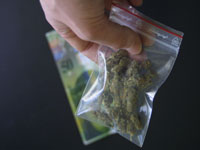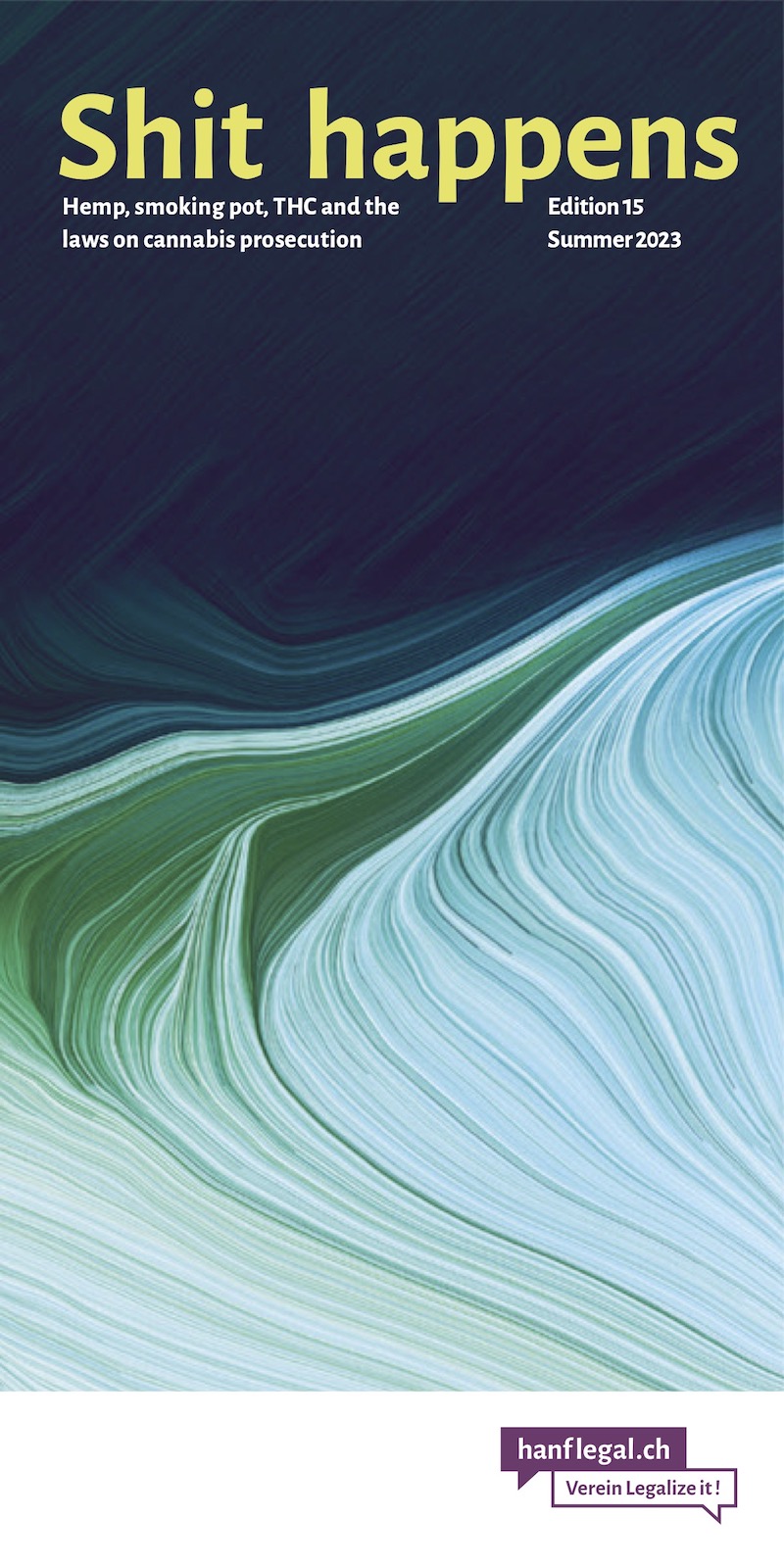- THC & Law:
weed dealing - an easy job?
The illegal business with hemp takes place in underworlds, but it functions according to the same economic laws as the legal economy. Whereby a realistic view often has to give way to clichéd prejudices.
In this article, I want to present the topic of security in the illegal indoor cannabis sector, to outline just one of the many challenges in the persecuted and complex cannabis business. This is followed by an insight into the risk analysis of professional hemp businesses.
Lucrative or stressful?
The illicit drug trade in general has a reputation for being a quick buck or even easy money, which, when looked at realistically, quickly turns out to be very short-sighted and naïve.
While in most legal industries you are taken care of all around with security (insurances, pensions, police protection, labor law, etc.), further education and more, in the so-called “underworld” you are left on your own - even more, you are actively persecuted! This means that you not only have to think about the actual business, you should also consider the area of security, which is a matter of course for everyone else, and in addition, you should adequately deal with the special risks for this business. The pressure and the workload, if one has the claim to work professionally, are higher than in most “normal” professions. This is almost always underestimated, which is not surprising, since it is not talked about completely openly (for security reasons) and not even most THC users know how their dealer works and under what kind of pressure he works.
This is for the simple reason that mere personal consumption is a contravention and distribution (whether one gram or 20 kilos) is a misdemeanor. In concrete terms, this means that any dealer, no matter how small, used to get at least a few months of conditional probation and today gets a conditional monetary penalty with, for example, 100 daily sentences of 100 francs, if caught, while a mere consumer has to pay a simple fine. So these two groups move in completely different worlds of security demands, which leads to the fact that even hemp consumers are often suspicious of professional suppliers.
When you read in newspapers about “drug dealers” whose “narcotics” have been seized from their “drug warehouse” and have now been arrested, you, as an unsuspecting person, hardly think that it could be a correct and professional dealer or producer of hemp products, who has always, with the best of his knowledge and conscience, made hundreds to thousands of THC consumers happy and accepts damage to his reputation and imprisonment for fair prices (apart from loss of earnings, lawyer's fees, court costs, etc.).
I hope I have succeeded in outlining the difficult topic and now move on to explain the security aspect from the point of view of professional hemp dealers.
Security in an uncertain business
What is safety anyway? Safety means that the risks that could potentially occur have been identified and are being dealt with in an appropriate manner so that they can be monitored and minimized. For this purpose, one uses the terms “probability” that a certain risk will occur and “impact” if the risk has occurred. On the basis of this one can meet the risk purposefully and not shoot with cannons on sparrows or on the other side, negligently opposite the environment (business partners, customers, etc.) and itself act.
In our field, for example, it would be like shooting a cannon at a sparrow if an occasional small-time dealer, who buys a quarter of a kilogram every few months in order to sell it to a select circle of stoner colleagues and earns a few hundred francs in the process, took measures to minimize the risk of being incriminated by telephone interceptions by the police drug investigation.
On the other hand, it is negligent towards one's own health, for example, if a dealer who makes two or three million in sales per year replaces a serious and sound risk analysis with excessive consumption of strong, sedative indoor weed. The abuse of hemp products is widespread in these circles and it is usually good manners to first smoke a few strong joints with your supplier before any deal.
Another example of negligent behavior is the frequent confusion of business and friendship, which takes place more in the area of small-time dealers. Trafficking in illegal drugs is not a round of billiards among colleagues! All the guys who think they should get away cheaper or otherwise claim benefits because they have been customers for a long time or because you once had a beer together or maybe even once had a conversation that goes beyond the business relationship are the last ones who would act according to the “friendship” they hold so high in case of emergency when the noose around their neck threatens to tighten just a little bit! As soon as they are under pressure, they see only their own disadvantages and, in the worst case, testify against their “friend”.
This falseness, which is partly not at all maliciously and consciously practiced, is a rather big danger, because these people talk a lot and have no real business at all. Herewith it is warmly recommended to every concerned reader to distance himself decidedly from such characters, because the probability to get into even stranger and dangerous situations by strange entanglements on their part is high and the effects are negligible to catastrophic depending on the situation.
But now to the actual risk analysis of a rather larger-scale hemp enterprise (from about one million francs sales per year); what are the dangers, what is the “worst case”, what are the consequences in case of emergency?
Averting the bad turn
The worst case is certainly the complete detection of the ever committed “crimes” by the police; a rather far-fetched case, which to my knowledge almost never occurs in the hemp sector. One would have to go to pretty great lengths or act in extreme style (perhaps starting at about 10 million francs in sales per year) to get any narcotics investigators to record, observe, and uncover the entire business. That is, the effects would be bad, the probability very small. So it's not a threat that should be overly prioritized. But it can be kept in mind and minimized to impossible by simple measures.
For example, you don't make phone calls - you can talk when you see each other! Also, you can use a meeting to arrange the next appointment, not forgetting to decide the quantity, price and so on already now. Of course, this requires a certain amount of planning and reliability, but these are indispensable anyway if you want to work professionally. Now, if from one meeting to the next it turns out that you actually want to order double, you can say so at that next meeting instead of calling and babbling some embarrassing stuff about CDs or footballs. Another safety rule of thumb: If I understand the codes, the potential listeners will understand it too. So there's no need for all those complicated phone codes. Apart from that, if in case of emergency, one can transmit a previously communicated and innocuous emergency message, for example a simple greeting, for the protection and information of business partners. One can have such a message stored in the drafts on the cell phone, so that in a situation that still allows to quickly send the SMS, the information of the most important business partners is guaranteed. They will then contact family, friends and other people who would like to know. Such a situation is given, for example, when “gstabige” narcotics officers, which any trained eye quickly recognizes, artfully ring the front doorbell and wait. Then you don't even have to press, you can still make one or two short phone calls. It is more difficult, for example, if someone is in the car, transporting a few kilograms of indoor and a few hundred cuttings, and is stopped and searched by the police. To be on the safe side, send the SMS as soon as possible, and in the best case scenario you can warn them again. In addition, it is advisable to destroy all sim cards carried on you immediately if possible.
Basically, the business with our favorite herb has nothing to do with cell phones and other modern technologies. It is an ancient business that has always existed - even without these things!
A better way to inform the necessary environment is to make an agreement with someone you are close to, someone you meet often. This looks then for example in such a way that the dealer (female dealers practically do not occur), who lives with his life partner, informed her about it, to whom she should report everything, so that as little as possible damage results for all. Most women have more trouble with such things than men, but they can be reassured by the fact that it is precisely for this reason that such safety rules are taken care of, because they also want to protect them.
What we see in reality in this regard are two prime examples: After a young dealer was released on parole from several months of pre-trial detention (his business had been at a standstill during this time), and two days later got into a police checkpoint with several dozen thousand francs and a kilogram of weed in his car (only thanks to the very calm behavior of the driver, too, nothing else happened), he thought that it might be better to come up with some contingency plans after all. As a safety measure in case of emergency, it was later agreed that the dealer's mother would contact a close associate in case he did not make the daily call one evening checking on her well-being. So one day he got a call from the helpful mother saying that she had not heard from her son in a long time and that he was not picking up the phone, which the colleague immediately understood and next dialed the number of his lawyer, who was also very helpful. Thus, the case was solved without any major losses for the family business.
The model of warning by close, if possible related, and otherwise completely legal helpers had worked flawlessly. Within a few hours all important business partners, the lawyers and so on had been informed, stocks had been moved and money had been hidden. And not by people who want to harm you, but by friends and partners who know how not to make a drama out of it (it is something different when a mother calls her son's personnel manager and tells him that her son has been temporarily arrested for hemp, probably due to an investigative error, than when some jerk tells him tersely that narcotics have been found and the delinquent has been arrested on suspicion of qualified trafficking in narcotics due to danger of collusion).
Another way to thwart observations by investigators is to keep your eyes and ears open, to be very attentive, to talk quietly, to constantly change the transfer locations or places - all without any communication other than personal conversation. Of course, one should not work stoned or otherwise distracted - a professional business attitude will help here as well.
As I said, the worst case and these simple answers to it should not be prevalent in the risk analysis, because otherwise other, more important risks will be neglected.
Clean work is central
Carelessness - the cliché of the imposed stoner, who doesn't think too much and is rather lazy, would find great confirmation here! Drug abuse is very widespread in the circles, which is not surprising, because just weed in high doses unfolds a dampening effect. Rest and relaxation - how often one wishes for these banal, simple and very strong remedies against addictions, stress, sleep disorders and many other disorders, not only in this area! There is already a lack of peace, quiet, relaxation and enjoyment in our highly work-oriented and productive society - imagine how it would be for you if you had to run an illegal SME in addition to your time-consuming job, your possibly even more stressful hobby and your family obligations! Of course, many reach for the bottle or the joint and overdo it massively. Because it is easier in the short term to always be stoned and calm than to afford yourself time and space for rest. The probability of occurrence is high, the effects can vary from harmless to bad. That means you have to face this risk with all your might! I am sure that this negligence is by far the most frequent reason for convictions, confiscations, etc. in the hemp business. This is especially confirmed by commercial growers - a daily smoker is much more likely to make careless and careless mistakes, as well as not working with the necessary care (ballasts for indoor lamps are poorly installed, resulting in fire; charcoal filters are not replaced for years, resulting in entire, wonderfully fragrant quarters; technical equipment is not maintained, which can lead to all kinds of problems, up to and including flooding at the neighbor's house; trucks are parked in front of the house in the middle of the night to unload a few tons of special soil; the air extractor is installed at head height directly on a walkway; room leases are stored in dealers' apartments, which are then searched and lead to the place of cultivation - the list could be extended indefinitely).
All this is not only in my opinion an outgrowth of lack of professionalism, which is in correlation with excessive consumption of this stimulant, which is produced there. At the same time, hemp is such a useful means to really relax, switch off and recharge - if you use it for that! Of course, this is the more uncomfortable part of the risk analysis, when you realize that all the complicated and elaborate security and communication ways are disproportionate and the realistic, fatal risks are much more banal. Realizing this should be a must for every dealer, because it's not just about small mistakes and maybe once a legal penalty - it's about health!
There you can see guys who made several millions of profit in about a decade with the indoor, drive luxury limousines and spend at least three months a year on luxury trips, but in the meantime are completely lonely and addicted to games and drugs. Some also had consumption problems - as soon as they saw something they liked, they had to buy it. Others ended up straight in the psychiatric ward! I have now described the worst case and the biggest risk factor; other of the many problems and difficulties in this context are to be discussed on a case-by-case basis.
If the point of professionalism is given and you leave yourself enough time and space to recover and come to rest outside the business (even more often without smoking pot!), a lot is already done. You can ask yourself from time to time: Am I acting the way such a business requires? Am I even capable of meeting my own demands? Am I possibly rushing into something? Am I trying to force anything? Do I smoke pot every day?
With these questions as an impulse for reflection, I conclude this text and hope that it has not only informed, but also made fun.
With great respect and esteem for all those who put their freedom on the line for our joints!
Risk assessment
Many think that the black market is a goldmine. This can be the case for years: a good margin without having to perform well. But the stress, the (not necessarily unjustified) paranoia put a lot of strain on most people. You can't really trust anyone - and at some point, sooner or later, but one day you'll be caught, end up in custody, lose your apartment, be socially branded. When you factor that part into the calculation, dealing just isn't worth it.
Basics for this article
This text is based on many heard stories and personal assessments. There are no documents in this area that could be evaluated. Nevertheless, we think the text conveys the mood and the problems in the illegal hemp trade well. The considerations described here should be seen as food for thought - because thinking about the problems and consequences of the illegal black market seems to us to be a very important point. Both for the consumers and for the traffickers.
Support our work with a donation:
Bank transfer
Account number (IBAN):
CH02 0900 0000 8709 1354 3
Full account details
Or scan this QR code with your eBanking App (ZKB, Revolut, Postfinance, …):

Or open/share the QR code as PDF file with your eBanking App.
Credit card
Donate via credit card
Verein Legalize it!
Quellenstrasse 25
8005 Zürich
Threema ID 7NH65RBY
Don’t miss anything! Follow us on social media:

